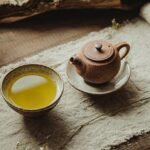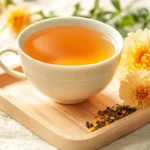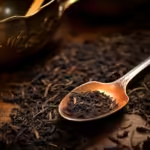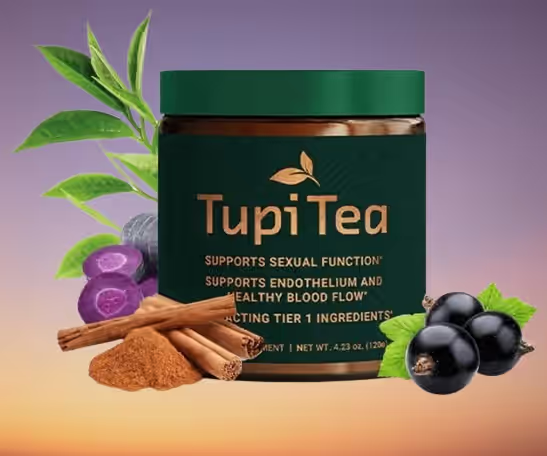Table of Contents
Black tea and milk, a classic combination savored by many. This blend is more than just a beverage. It’s a comforting ritual, a moment of relaxation, and a taste of tradition.
But what makes this pairing so special? Why do we add milk to black tea?
This article will explore the rich history, health benefits, and cultural significance of black tea with milk. We’ll also share tips on how to brew the perfect cup and some delicious black tea recipes.
Join us on this flavorful journey and discover the magic of black tea and milk.
The Rich History of Black Tea and Milk
Black tea has a storied past, tracing back to ancient China. It spread globally through trade routes, captivating tea lovers worldwide. The allure of black tea lies in its robust flavor.
The tradition of adding milk to tea may surprise some. This practice emerged in the 17th century. It began as a way to protect delicate china cups from cracking under heat.
British culture has embraced this tradition wholeheartedly. “Tea with milk” became a staple in English afternoon tea rituals. This combination is now a symbol of British hospitality.
In India, black tea and milk form the foundation of “chai.” Chai is a spiced milk tea beloved by many. The spices add complexity and warmth to each sip.
Milk and black tea have also found a home in other cultures. Each region has its unique twist on this pairing. They reflect local tastes and customs.
Over time, the blend of black tea and milk evolved into a global phenomenon. It bridges cultural divides and unites people through a shared appreciation for good tea.
👉 Bold Mornings Start Here – Sip the Best Black Tea! 👈
Health Benefits of Black Tea with Milk
Combining black tea with milk creates a beverage that’s both comforting and nutritious. It offers several health benefits worth noting. Let’s explore these benefits further.
Firstly, black tea contains antioxidants known as flavonoids. These compounds are believed to promote heart health. They can help reduce the risk of cardiovascular disease.
Adding milk to black tea might enhance certain health benefits. Milk is a rich source of calcium. This nutrient is essential for maintaining strong bones.
However, there’s a debate about milk’s effect on antioxidants. Some studies suggest milk proteins may inhibit antioxidant absorption. This remains a topic of ongoing research.
Consuming tea with milk can also be hydrating. While not a replacement for water, it contributes to daily fluid intake. It can be a refreshing alternative to plain water.
Milk tea benefits extend to providing a moderate caffeine boost. Black tea contains less caffeine than coffee. It can improve alertness and focus without jitters.
The addition of milk also helps mellow the tea’s natural bitterness. This makes it more palatable for some people. The creaminess adds a layer of richness, enhancing the overall taste.
In summary, milk and black tea together offer a delightful mix of flavor and potential health perks. Enjoy this soothing combination as part of a balanced diet.
The Nutritional Profile of Milk Tea
Black tea with milk offers a varied nutritional profile. It’s a drink that combines the benefits of both its core ingredients. This makes it a popular choice among health-conscious individuals.
Milk tea provides essential vitamins and minerals. Calcium, vitamin D, and protein are abundant in milk. These elements support bone health and overall well-being.
The type of milk used can affect nutritional content. Whole milk adds more calories and fat. Skim or plant-based milks reduce calorie content.
Customizing milk tea allows for personal dietary preferences. Sweeteners can increase caloric intake. However, the choice of sweetener can cater to different health goals.
Antioxidants and Heart Health

Black tea and milk serve up key antioxidants. Flavonoids in black tea are linked to reduced heart disease risk. They contribute to heart health by improving blood vessel function.
Antioxidants found in black tea may also help manage cholesterol. This can lead to decreased risk of stroke. However, moderation is key to avoiding excessive caffeine intake.
The potential interaction between milk and antioxidants remains under study. Milk may alter antioxidant efficiency, but the full impact is unclear. Still, both tea and milk offer their own unique health aspects.
Enjoying black tea with milk in moderation can benefit overall heart health. It combines the advantages of antioxidants with essential nutrients from milk. Embrace this nourishing beverage as a part of your lifestyle.
👉 Rich, Robust, and Ready – Try Premium Black Tea Today! 👈
How to Make the Perfect Cup of Black Tea with Milk
Creating the perfect cup of black tea with milk involves a few key steps. Start with high-quality ingredients. The type of milk and tea you choose matters greatly.
Begin by boiling fresh, cold water. Using fresh leaves or quality tea bags makes a difference. Allow it to steep for just the right amount of time.
While the tea is brewing, warm your milk separately. This helps to maintain the tea’s temperature. Add your chosen sweetener if desired.
Once the tea reaches your preferred strength, blend in the milk. Experiment with the ratio until it suits your taste. Some enjoy equal parts, while others prefer a hint of milk.
Choosing the Right Ingredients
Choosing the best ingredients is crucial for an exceptional cup. Start with high-quality black tea leaves or bags. Loose-leaf options often provide a richer flavor.
The milk you choose can affect both taste and nutrition. Whole milk offers creaminess, while skim is lighter. Non-dairy alternatives like almond or soy add a unique twist.
Consider your dietary preferences when selecting sweeteners. Sugar, honey, or stevia can all add sweetness. Each brings a different depth and aroma to your tea.
Finally, ensure that all ingredients are fresh. Fresh tea and milk lead to the best taste. Keep them stored properly to maintain their quality.
Brewing Techniques for Optimal Flavor
Crafting the perfect brew requires attention to technique. Start with water just off the boil. Pour it over the tea leaves or bag.
Steeping time is crucial to unlocking flavor. Too long and the tea can become bitter. 2-5 minutes usually strikes the ideal balance.
Pay close attention to the temperature of your milk. Warm milk integrates better with hot tea. Cold milk can cool the tea too quickly, altering taste.
Gently stir after adding milk to blend flavors. This small step enhances uniformity and richness. It can make a noticeable difference in overall taste.
The Milk in First vs. Milk in Last Debate
The debate over milk’s place persists among tea lovers. Some argue for milk first, ensuring a smoother blend. Others swear by adding milk last to gauge strength.
👉 Classic Flavor, Timeless Energy – Discover Top Black Tea! 👈
Delicious Black Tea Recipes with a Twist of Milk
Experimenting with black tea and milk can lead to delightful discoveries. A few recipes can transform your tea routine.
Begin with classic milk tea, loved for its simplicity. It’s easy yet satisfies even discerning palates.
For something different, try spiced chai. This exotic take pairs spices with creamy milk.
To get started, use the list below for inspiration:
- Classic Milk Tea
- Spiced Chai
- Bubble Milk Tea
- Iced Mint Milk Tea
Classic Milk Tea Recipe

To create classic milk tea, start with your favorite black tea. Brew as usual and mix in warm milk.
Adjust the milk-to-tea ratio to your preference. Sweeten with sugar or honey to taste. It’s comfort in a cup.
Spiced Chai: An Exotic Take
Create a spiced chai by brewing strong black tea first. Add cinnamon, cardamom, and ginger.
Stir in milk and let the flavors meld together. This warm beverage is perfect for cozy evenings.
👉 Wake Up Right – Brew a Strong Cup of Black Tea! 👈
Cultural Significance and Social Aspects of Milk Tea
Milk tea is more than a beverage; it’s a cultural emblem. Different regions have unique rituals and customs.
In some countries, tea ceremonies hold great importance. These rituals reflect respect and hospitality.
Sharing milk tea often builds connections. It fosters conversation and strengthens social bonds.
From casual gatherings to formal occasions, milk tea enhances community spirit. It celebrates unity and togetherness.
Tea Traditions Around the World
Different countries embrace tea in distinct ways. In the UK, afternoon tea often includes black tea with milk.
In India, chai lattes are a daily staple, rich with spices and robust flavors. These traditions reveal diverse tea experiences.
Sharing a Cup: The Social Experience
Gathering over tea is a timeless social practice. Friends and family frequently meet to enjoy conversations with a warm cup.
The act of making tea becomes a thoughtful gesture. It brings people together, weaving shared stories and laughter.
Conclusion: Embracing the Versatility of Black Tea and Milk
Black tea and milk blend beautifully in flavor and tradition. From rich histories to modern recipes, their combination offers warmth and variety. By exploring different recipes and techniques, you can discover your ideal cup. Whether for health benefits or relaxation, embrace this versatile beverage on any occasion.
👉 For the True Tea Lover – Taste Bold Black Goodness! 👈
FAQs
Is black tea with milk good for you?
Yes, it can be beneficial when enjoyed in moderation. Black tea offers antioxidants, and milk provides calcium, contributing to overall health.
Can I use non-dairy milk in black tea?
Absolutely! Almond, soy, or oat milk are popular alternatives that complement black tea without lactose.
How should black tea and milk be stored?
Store black tea in a cool, dry place. Milk is best kept refrigerated to maintain freshness and quality.
Does adding milk reduce the caffeine?
No, milk does not affect caffeine content. The caffeine level depends on the tea type and brewing time.













